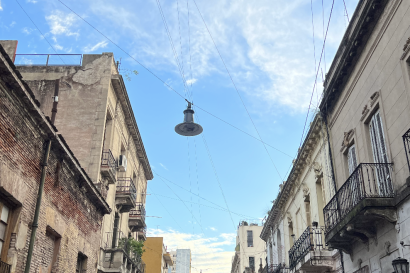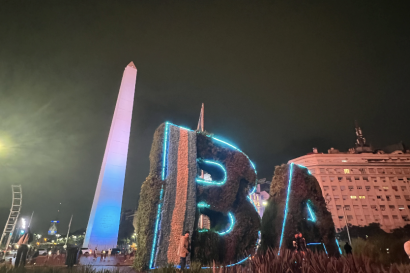(del 6 de abril)
Hoy estaba atrapada en casa todo el día. ¿Por qué? Porque hoy fue el paro general -- cada trabajador del sector transporte no trabajaba hoy. Entonces, porque casi todos utilizan el transporte público, nadie trabajaba hoy, y, por eso, nada estaba abierto. ¿Qué podés hacer sin transporte, negocios o escuela? No mucho, menos hacer tarea todo el día en casa (porque las cafeterías y bibliotecas también están cerradas) o caminar al parque (porque no podés tomar el colectivo allá).
Quizás pensás que este evento, un paro general en que fundamentalmente cada persona en el país deja de trabajar, es algo extraño. Para la gente argentina, no es extraño, es algo muy familiar. En los 3 meses en que me he quedado acá, ha habido dos paros, hoy y durante la segunda semana de facultad. El primer paro fue cancelado por problemas con los sindicatos, pero el paro hoy de veras pasó. Casi toda la ciudad está cerrada. Mis clases de IES Abroad fueron canceladas, las clases de mi hermano de UBA también canceladas. Sólo mi clase de DiTella no fue cancelada, pero no tenía ninguna manera para asistirla entonces no fui. Mi hermano todavía no puede regresar a casa porque también las estaciones de gasolina están cerradas y las calles están cortadas por las protestas acompañando el paro. Cuando miro afuera, no hay nadie afuera en las calles; la ciudad está totalmente silente.
Entonces, ¿qué quieren estos trabajadores? ¿Por qué manifiestan? ¿Qué piden?
Los paros son el método de los sindicatos de pedir sueldos mejores, beneficios y derechos del empleo si negociaciones tradicionales no funcionan. Para el sector transporte específicamente, cuando tienen huelgas, están directamente contra el gobierno, su empleador. Han executado este paro en particular porque el sindicato y el gobierno han debatido por 15 meses, pero el gobierno sólo ha aumentado las tarifas y no ha hecho ningún cambio al salario.
Este paro pasado fue el primer paro bajo la presidencia de Macri, el presidente actual. En su campaña, Macri prometió la intervención policial en los paros y los cortes de calles. Que yo sepa, no había ninguna intervención policial en las demostraciones ni los cortes de calles, si hubiera alguna intercesión, mi hermano no estaría detenido en la casa de su novia en Mataderos. Pienso que es mejor que la policía no interviene, ya hemos visto que pasa con interferencia policial en demostraciones tranquilas en los Estados Unidos.
---
General Strike
(from April 6)
Today I was trapped at home all day. Why? Because today was “el paro general”- a strike that included every transport sector worker in the country. Because almost everyone uses public transport, nobody worked today, and, in turn, nothing was open. So what is there to do without transportation, businesses, or schools? Not much, besides doing homework all day at home (because the cafes and libraries are also closed) or walk to the park (because you can’t take a bus there).
You probably think that an event of this sort, a general strike in which basically every person in the country stops working, is weird. For the Argentinians, it’s nothing unfamiliar; at this point, it’s something people are accustomed to. In the 3 months that I have stayed here, there have been two “paros generales,” today and another one during my second week of school. The first strike was canceled due to problems with the unions, but, as evidenced by the empty streets, this second strike really occurred. Almost the whole city is closed. My IES Abroad classes were canceled, my brother's classes at UBA also canceled. The only class that wasn't cancelled was my DiTella class, but I had no way to get there anyways so I didn't go. My brother still cannot come home because the gas stations are also closed and the streets are also closed due to protests accompanying the strike. Just looking outside my window I can see its effects; there is no one out there, not a car nor person. The city is totally silent.
So what do these workers want? Why are they protesting? What are they asking for?
Strikes are the unions' method of asking for better wages, benefits and employment rights if traditional negotiations do not work. For the transport sector specifically, when they have strikes, they are directly against the government, who is their employer. The current general paro is taking place because the union and the government have debated for 15 months, but the government has only raised rates and made no changes to wages.
This past paro general was the first general strike under the presidency of Macri, the current president. In his campaign, Macri promised police intervention in the strikes and street cuts. As far as I know, there was no police intervention in the demonstrations or the street cuts, if there were any intercession, my brother would not be detained at his girlfriend's house in Mataderos. It’s probably best that police don’t get involved, we have already seen enough police intervention ends in peaceful protests to know how things end.
For more information:
http://www.perfil.com/politica/la-cgt-anuncia-en-la-marcha-del-7m-el-primer-paro-general-contra-macri.phtml
Amanda Landaverde
<p>Amanda Landaverde is a 20 year-old Spanish and Psychology student at Gustavus Adolphus College who aims for a career in neuroscience studying generational trauma. In her free time, Amanda likes to creatively illuminate and counteract social injustice through art, writing, and performance with her social justice theatre troupe on campus.</p>






